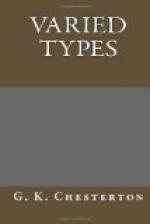Men are very much too ready to speak of men’s work being ordinary, when we consider that, properly considered, every man is extraordinary. The average man is a tribal fable, like the Man-Wolf or the Wise Man of the Stoics. In every man’s heart there is a revolution; how much more in every poet’s? The supreme business of criticism is to discover that part of a man’s work which is his and to ignore that part which belongs to others. Why should any critic of poetry spend time and attention on that part of a man’s work which is unpoetical? Why should any man be interested in aspects which are uninteresting? The business of a critic is to discover the importance of men and not their crimes. It is true that the Greek word critic carries with it the meaning of a judge, and up to this point of history judges have had to do with the valuation of men’s sins, and not with the valuation of their virtues.
Tennyson’s work, disencumbered of all that uninteresting accretion which he had inherited or copied, resolves itself, like that of any other man of genius, into those things which he really inaugurated. Underneath all his exterior of polished and polite rectitude there was in him a genuine fire of novelty; only that, like all the able men of his period, he disguised revolution under the name of evolution. He is only a very shallow critic who cannot see an eternal rebel in the heart of the Conservative.
Tennyson had certain absolutely personal ideas, as much his own as the ideas of Browning or Meredith, though they were fewer in number. One of these, for example, was the fact that he was the first of all poets (and perhaps the last) to attempt to treat poetically that vast and monstrous vision of fact which science had recently revealed to mankind. Scientific discoveries seem commonly fables as fantastic in the ears of poets as poems in the ears of men of science. The poet is always a Ptolemaist; for him the sun still rises and the earth stands still. Tennyson really worked the essence of modern science into his poetical constitution, so that its appalling birds and frightful flowers were really part of his literary imagery. To him blind and brutal monsters, the products of the wild babyhood of the Universe, were as the daisies and the nightingales were to Keats; he absolutely realised the great literary paradox mentioned in the Book of Job: “He saw Behemoth, and he played with him as with a bird.”




